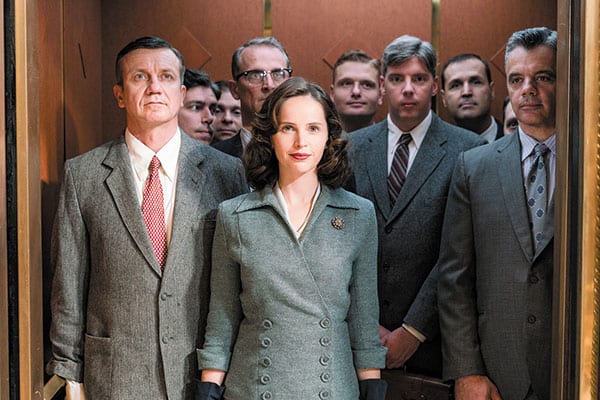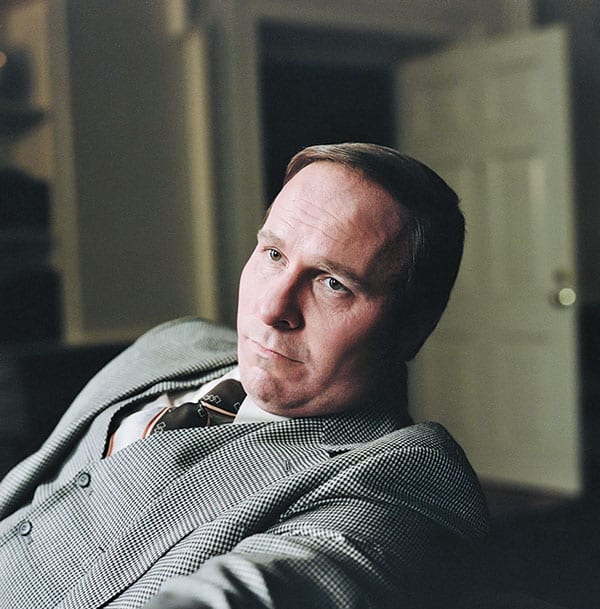Stephan James and KiKi Layne light up the screen in ‘If Beale Street Could Talk,’ the new film from ‘Moonlight’ writer-director Barry Jenkins,
based on James Baldwin’s novel.
Socially aware movies are flooding cinemas on Christmas Day, some more successfully than others
ARNOLD WAYNE JONES | Executive Editor
jones@dallasvoice.com
“If you wanna send a message,” old-school movie mogul Samuel Goldwyn was quoted as saying, “call Western Union.” But the truth is, Goldwyn as much as any of the original studio bosses was just as socially conscious as the next guy. But he conveyed his messages in a manner endemic to the stories, as in The Best Years of Our Lives or Porgy and Bess.
The starkness of that distinction — films that send messages, versus ones that embody them — is evident in four films opening on Christmas Day.
If Beale Street Could Talk
The avatar for Goldwyn’s dictum is most powerfully conveyed in the best of the lot. There is a profound difference between diversity and inclusion in the arts, versus voices … stories. That realization hit me like a locomotive as I watched If Beale Street Could Talk, writer-director Barry Jenkins’ adaptation of James Baldwin’s 1974 novel about love and justice.
It’s the 1970s, on the cusp of the Civil Right Movement, but 19-year-old Tish (KiKi Layne) and 22-year-old Fonny (Stephan James) aren’t bothered by the politics of the time — they are too busy being crazy for each other. They’ve been playmates almost since infancy, but their romance burgeons as each comes into their own: Fonny as a craftsman who lives to create with his hands, Tish as a maturing woman viewing the world through a newly-discovered independence. But within just a few weeks, their lives are upturned when Fonny is falsely accused of rape, and Tish finds herself pregnant. As they both navigate proving Fonny’s evidence and preparing for the child to come, we experience the fabric of their lives in flashbacks, slowly illuminating the social factors that have guided their lives, perhaps without them even realizing it.
Here and in his last film, the exquisite Moonlight, Jenkins’ mastery as the foremost chronicler of the black experience is most powerful because, as a storyteller, he’s more focused on the people than the message. He turns his camera onto Fonny’s dark-skinned handsomeness, and Tish’s beatific resolve not with the woozy fantasy of a dream, but the authenticity of seeing humans for who they are. There’s an electricity between Layne and James — a light, an aura that exudes from them when they are onscreen together — that Jenkins captures in images. And let then lets Baldwin’s words — his wit and language, braced by his abiding intellectualism — to complete the circle. Piece by piece, they assemble a jigsaw puzzle of love and justice, never hesitating to show the horrendous consequences of casual racism… and the profound generosity of the human heart when such constructs are abandoned. (Regina King, as Tish’s mom, is fiercely on her way to nabbing an Oscar nomination.)
Composer Nicholas Britell, who smartly used the chopped and screwed remix technique in creating his score for Moonlight, does something similar here, evoking a free-wheeling jazz score but overlaying it with a more classic melody-based through-line that lulls and excites you simultaneously. (Jenkins has a way of making a terrible, violent act feel viscerally gratifying, and the score wisely avoids milking them.)
The title is a straw man: Beale Street — a famed boulevard in Memphis (peculiarly identified in the opening scroll as in New Orleans) — was a focal point of the blues, the indigenous music form of black culture that stood at the intersection of urban and rural society at the turn of the last century. Its stories would represent those of every African-American who struggled through Jim Crow and freedom rides, lynching and loving. The title, then, is specifically designed to disguise the message, and put at the forefront a romance that is at once intimate and universal — there’s something urgent about telling this story of these people at this time… and yet effortlessly a story for the ages.

Felicity Jones’ wan performance doesn’t help Notorious RBG biopic.
On the Basis of Sex
That’s the good news; now for the bad. Let’s start with a confession: I’m a total fan-boy for Notorious RBG, aka Supreme Court Associate Justice Ruth Bader Ginsburg, so it isn’t the subject matter of On the Basis Of Sex, the new biopic about the early life of the birdlike liberal maven, but the pedestrian and flat telling of her life that so disappoints me.
It begins within the ivied walls of Harvard Law School in 1956. Amid a sea of blue serge floats a cerulean tweed skirt set. Ruth (Felicity Jones) is one of only nine women admitted to our most revered academy of legal training, but she’s confronted at every turn by misogyny, both casual and active, from condescending classmates to prickly potential employers. She muddles along as her husband Marty (Armie Hammer) rises in his law career while she marks time teaching. All the while, in the background, lurks an inherent understanding: For an oppressed minority to succeed, it has to be twice as good to get half the credit.
But for much of this film, that’s exactly what’s missing. Oh, sure, Ruth’s daughter and husband drone on about how she’s the always smartest person in the room, but she never proves herself to warrant that praise; she’s a milquetoast lecturer at Rutgers, a voice shouting in the wilderness for equal treatment for women…. No, not shouting. Whispering. Kvetching. Shrugging.
Then, in 1970 — having never stepped foot inside a courtroom — she gets a wild hair that she might want to take on an appeal: A man named Moritz who was denied a tax benefit because of his gender. If she can convince the 10th Circuit that sex-specific laws punish men, well, it’s a slippery slope to the passage of the Equal Rights Amendment.
On the Basis of Sex is the kind of movie, like The People vs. Larry Flynt, where every scene feels calculated to say, “Ya see? We told ya so” about its central thesis. It cherry-picks the most egregious injustices in Ruth’s life, then has Ruth glower in silence. The only constant emotional state in every scene is a smug sense of righteous indignation. (The following is an actual line of dialogue: “This lawsuit could bring down the whole damn system of discrimination!!!!!” Ugh.)
The director, Mimi Leder, was weaned on television shows like ER, and there’s a TV-ish tone that the film cannot overcome. Visually, it lacks edge: a shot on the Capitol steps seems unnecessary and banal, and the characterization of the people, divided solely between either conspiratory villains or morally superior cynics, is sophomoric. (You can always identify the bad guy in a lazy movie: He’s the notorious Hollywood liberal — in this case, Sam Waterston — playing the arch conservative with no redeeming qualities.) It’s the trope of the lone crusader versus everyone else; even her heroes and colleagues tell her she can’t win… and they’re right, until they are not and are chastened and apologetic. That might work across 44 minutes plus commercials, but it grows tiresome after two hours.
It doesn’t help that Felicity Jones is about as convincingly Jewish as a BLT, and more Brookline than Brooklyn (her accent comes and goes). And while Hammer is downright dreamy, even lovable, as Marty, everyone else seems to be on autopilot. I wanted A Beautiful Mind or even Molly’s Game; what we get is nowhere near as good as that, not even a warmed-over Paper Chase. I respectfully dissent.

Christian Bale plays a genuine Dick in ‘Vice,’ above; below, Nicole Kidman in ‘Destroyer.’
Vice
Writer-director Adam McKay’s last film, about the credit-default swap program that led to the worldwide financial crisis, was called The Big Short. His newest, a biopic of the vampiric pol Dick Cheney, could have been called The Long Con. Instead, he titled it Vice, which is almost as good. It tracks Cheney’s life from youthful aimlessness (when, according to McKay, he really earned the name “Dick”) to self-appointed shadow president, manipulating the Constitution, constituents and colleagues in order to reshape America to his own image.
You could appreciate in a Machiavellian sense (if not agree with in practice) his single-minded resolve if you felt that Cheney was a true believer — a dyed-in-the-wool neo-con laser-focused on a New World Order. But what McKay and the film make clear is that Cheney didn’t believe in anything except himself and how deftly he could wield unbridled authority. Dick Cheney was a dry-run for Donald Trump’s presidency, one not guided by principles but profits… if not monetary, ego-driven.
In the hands of Christian Bale, it’s a joy to watch him tick. Bale’s tour-de-force performance is bracing in its verisimilitude. That voice! That snarl! That cold monotone oozing contempt for the sheeple he deigns to bless with his genius. He’s uncanny and relentless, and probably the best thing about Vice.
Because the film, despite its right-side-of-history dissection of a fulcrum point of political power, is a visual and structural muddle. McKay employs so many Tarantino-esque flourishes — collages of B-roll and goofy (if withering) asides — they devolve into oppressive gimmicks. A few work: The moment 45 minutes in when a false history of Cheney’s post-Reagan Era scrolls and the end credits roll, only to jolt up back to the reality of his insidiousness. Or when a conversation between Dick and his wife Lynne (Amy Adams) — ultimately, an even more odious and conniving weasel, a doctrinaire harridan whose homophobia extended to her own daughter — turns into a Macbethian plot. But McKay rivals Seth McFarlane in his rejection of the barest hints of subtlety; the voice-over outright calls Dick a “dirt-bag,” a bit of low-hanging fruit that forces the film into internet meme territory. If we want sanctimonious name-calling, we can see a Michael Moore documentary.
There’s little “new” to be learned from Vice; it seems unlikely conservatives will have their minds altered or liberals will say much more than “Just as I thought!” McKay spends all of 30 seconds on Bush v. Gore, and some of the timeline and factual details seem wrong. And yet… I feel compelled to recommend it for its Orwellian accuracy. In addition to Bale and Adams, Steve Carell as Don Rumsfeld and especially Sam Rockwell as George W. Bush deliver outstanding, convincing performances. And when it comes down to it, McKay seems content in coalescing the litany of transgressions undertaken by the Cheneys, and how they and their lot poisoned the well of presidential politics for a generation or more. We need our chroniclers, our historians, our journalists to reveal the truth. But it only matters if we do something down the road to learn from their messages.
Destroyer
 Funny how critics tend to use words like “brave” and “fearless” when reviewing glamorous beauties of the silver screen who play dislikable, makeup-free anti-heroes in dramatic roles, but never use those terms to describe character actors who make their livings doing the same thing. No matter — a good performance is a good performance, and Nicole Kidman delivers one in Destroyer, a gritty crime thriller that seems pre-programmed to be described as a “gritty crime thriller.”
Funny how critics tend to use words like “brave” and “fearless” when reviewing glamorous beauties of the silver screen who play dislikable, makeup-free anti-heroes in dramatic roles, but never use those terms to describe character actors who make their livings doing the same thing. No matter — a good performance is a good performance, and Nicole Kidman delivers one in Destroyer, a gritty crime thriller that seems pre-programmed to be described as a “gritty crime thriller.”
Kidman plays a haggard police detective named Erin Bell. Fifteen years earlier, Bell went undercover, but the assignment went haywire, and she has wallowed in the consequences since. When she believes that Silas, the criminal who got away then, is back, she takes unorthodox steps to track him down and exact some modicum of justice and — say it with me — rehabilitate herself and atone for her misfortunes. It’s a ghost story, where the ghosts are real.
The existential cop drama is nothing new… nor is the drunk cop, or the rebel cop or the troubled cop. But having that cop be a woman is a small innovation, and there’s a palpable desperation in Kidman’s embodiment. Brave? I dunno. But pretty damn good.
The film overall… not so much It’s darkly underlit and largely predictable. Director Karyn Kusama (Aeon Flux, Girlfight) handles the brutality effectively, but not exceptionally: Its industrial noises, intense gazing and extended shoot-outs suggest the first season of True Detective, only with less style. The film’s lack of uniqueness torpedoes it.
……………
Notable releases now playing
Mary Poppins Returns
Aquaman
Ben Is Back
Spider-Man: Into the Spider-Verse
Mary Queen of Scots
Welcome to Marwen
Opening Dec. 25
If Beale Street Could Talk
(reviewed this week)
On the Basis of Sex
(reviewed this week)
Vice (reviewed this week)
Destroyer (reviewed this week)













